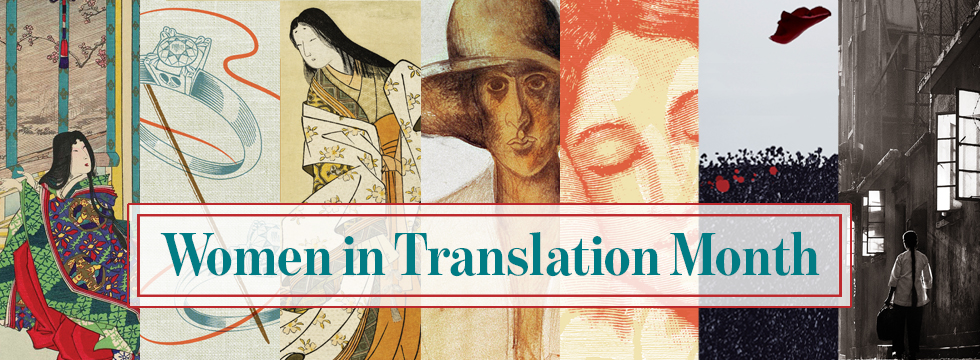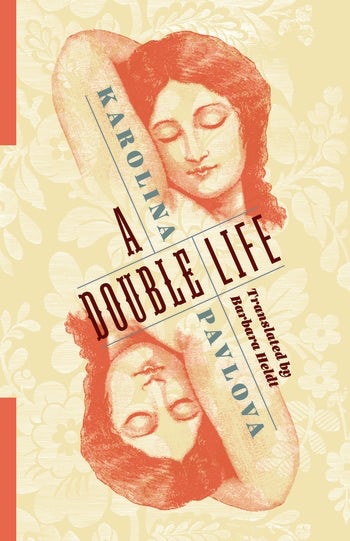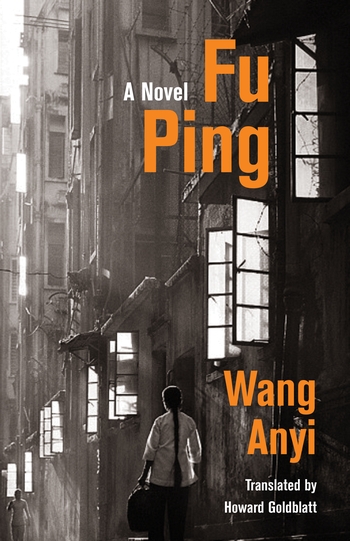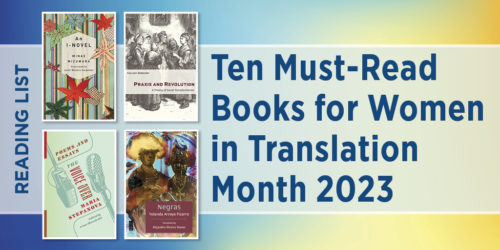Women in Translation Month 2019: A Celebration of Poetry and Fiction from Russia and East Asia

Welcome to Women in Translation Month 2019! WITMonth began five years ago when Meytal Tadzinkski noticed that women writers made up less than half of published translations. Since then, WITMonth has grown into a global movement giving voice to women writers around the world.
This month, we encourage our readers to join the conversation by reading, reviewing, and discussing our new and backlist translations authored by women. Join us in celebration as we feature guest posts, excerpts, and reviews about the translated works. And remember to check back each Monday for a chance to win a copy of one of these fabulous titles!
We’re kicking off translation month with a look at women poets from Russia, China, Korea, and Japan. Barbara Heldt will also discuss how the life of a work can change once it’s translated and read by a global audience.
Headlining the week is Karolina Pavlova’s A Double Life— a 19th-century Russian society novel about the rigidity and materialism of the aristocracy. By day, the protagonist Cecily, is slowly trapped in a miserable marriage by the machinations of her mother and best friend. At night, vivid dreams, written in soaring verse, offer freedom, at least for her imagination.
Those interested in this book, may enjoy last year’s WITMonth feature on City Folk and Country Folk, by Sofia Khvoshchinskaya, and translated by Nora Seligman Favorov. This unsung gem of nineteenth-century Russian literature is a seemingly gentle yet devastating satire of Russia’s aristocratic and pseudo-intellectual elites in the 1860s that centers on a common-sense, hardworking noblewoman and her self-assured daughter living on their small rural estate.
Both books are part of our Russian Library series.
The following week will feature the works of Heian court writers. We’ll begin with a look at The Pillow Book of Sei Shōnagon, a canonical work of Japanese literature published in our Translations from the Asian Classics series and the subject of Gergana Ivanova’s new Unbinding The Pillow Book: The Many Lives of a Japanese Classic. Sonja Arntzen will close the week with a post in which she reflects on her experience with The Sarashina Diary as a teacher, reader, and translator.
Written in the 11th century, our featured backlist title, The Pillow Book of Sei Shōnagon details the observations, experiences, and reflections of a court lady writing at the height of Heian literature. It enthralls with its lively gossip, witty observations, and subtle impressions.
The book has had a lasting impact on Japanese culture and has inspired many writers, artists, scholars, and filmmakers within and outside of Japan. In March, Ivanova discussed the “tragedy” of the talented author in the guest post, Sei Shōnagon: Why Gender Stereotypes of an Ancient Woman Writer Still Resonate Today.
Take a journey through Shanghai! During the third week of WITMonth, we’ll focus on Fu Ping: A Novel, by Wang Anyi. Jie Li, author of Shanghai Homes: Palimpsests of Private Life, (from our Global Chinese Culture series) will discuss Shanghai as seen in literature. We’ll also feature an interview with Howard Golblatt, who translated Fu Ping.
In Fu Ping, a sharp-eyed young woman from the countryside observes the bustling alleys and sidestreets of Shanghai in the pivotal 1960s, giving intimate portraits of the lives of the working-class people who make the city run.
The novel is part of our Weatherhead Books on Asia series, which includes two short story collections translated from Korean into English by husband and wife duo Bruce and Ju-Chan Fulton. Read last years WITMonth excerpt from River of Fire and Other Stories by O Chŏnghŭi, whose work has invited rich comparisons with the achievements of Joyce Carol Oates, Alice Munro, and Virginia Woolf.
The post also includes an excerpt from Korean writer Ch’oe Yun’s first published work in literature, There a Petal Silently Falls, which follows the wanderings of a girl traumatized by her mother’s death during the 1980 Kwangju Massacre.
We’ll conclude WITMonth 2019 with a celebration of contemporary Russian literature from our Russian Library series. Our lead title will be Margarita Khemlin’s Klotsvog. Set against the unresolved trauma of World War II and her ambiguous relationship with her Jewish identity, in this novel, the vain, selfish, and quarrelsome Maya Abramovna Klotsvog tells the reader all about her affairs, apartments, and professional sacrifices.
The week will also include a guest piece by Marian Schwartz, who recently wrote about translating Olga Slavnikova’s The Man Who Couldn’t Die: The Tale of an Authentic Human Being.
Another work from the series featured in WITMonth 2018 is Linor Gralik’s Found Life: Poems, Stories, Comics, a Play, and an Interview. One of the first Russian writers to make a name for herself on the Internet, Goralik writes conversational short works that conjure the absurd, reflecting post-Soviet life and daily universals. Her mastery of the minimal is on full display in this collection of poems, stories, comics, a play, and an interview, translated for the first time.
Don’t limit yourself to these featured titles. Fill your collection with works by talented women in translation by taking advantage of our WITMonth sale! Check our website for the complete list of promotional titles and use coupon code WIT2019 at checkout to save 30% on your order.
Categories:Book of the WeekLiterary StudiesTranslationWomen in Translation
Tags:a double lifeBruce FultonCh’oe YunCity Folk and Country FolkFound LifeFu PingGergana IvanovaJu-Chan FultonKarolina PavlovaklotsvogLinor GralikMargarita KhemlinNora Seligman FavorovO ChŏnghŭiRiver of Fire and Other StoriesRussian LibrarySofia KhvoshchinskayaThe Pillow Book of Sei ShōnagonThere a Petal Silently FallsUnbinding the Pillow BookWang AnyiWeatherhead Books on AsiaWITMonthWITMonth19












